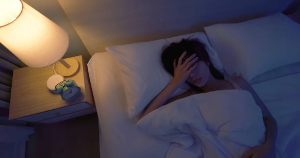In today's society, many people find themselves wide awake at night. As the night progresses, their minds become clearer, and they often feel more active, only to finally fall asleep in the early morning hours. If you struggle to wake up in the morning and experience extreme drowsiness during the day, you might be dealing with more than just a lack of sleep—there’s a chance you could be experiencing Delayed Sleep Phase Syndrome (DSPS).

What is Delayed Sleep Phase Syndrome?
Delayed Sleep Phase Syndrome is a condition where an individual's internal biological clock is delayed by two or more hours compared to the typical sleep schedule. This means that their ideal sleep time is pushed back, making it difficult to fall asleep at the desired time. For instance, while most people naturally sleep between 11 PM and 7 AM, those with DSPS might find it more natural to sleep between 2 AM and 10 AM.
This sleep disorder can easily be confused with insomnia, but there are clear differences. While insomnia is characterized by difficulty falling asleep or frequent awakenings during the night, DSPS involves relatively stable sleep, but at a much later time than the usual sleep schedule.
Causes and Effects of Delayed Sleep Phase Syndrome
The primary cause of DSPS is an imbalance in the body’s biological clock. Our bodies operate on a 24-hour cycle known as the circadian rhythm, which regulates physiological functions, including sleep and wakefulness, and is influenced by hormones like melatonin.
Melatonin is a hormone that induces sleep, and its production increases in dark environments. However, exposure to artificial light late at night, particularly blue light from screens such as smartphones or computers, can suppress melatonin production, delaying sleep. This is one of the main factors contributing to DSPS.
If this condition persists, it can prevent the proper formation of a sleep rhythm, leading to chronic fatigue. The habit of staying up late can also cause headaches, irritability, loss of appetite, weakened immunity, and in severe cases, disrupt daily life and even lead to mental health issues like depression.
Managing and Preventing Delayed Sleep Phase Syndrome
Overcoming DSPS requires maintaining a healthy biological rhythm. Here are some practical steps.
Consistent Morning Wake-Up Routine
Waking up at the same time every day is crucial. It’s beneficial to expose yourself to bright light in the morning as much as possible. Exposure to natural light lowers melatonin levels and helps the body naturally transition to an alert state, making it easier to fall asleep at night and gradually adjust your circadian rhythm.
Avoiding Naps
It's advisable to avoid napping during the day, as it can reduce the need for sleep at night, making it harder to fall asleep. Particularly, avoid napping after 3 PM, and if a nap is necessary, limit it to 30 minutes or less.
Regular Exercise
Regular exercise helps improve sleep quality. Exercise relaxes the body and reduces stress and anxiety, helping maintain a consistent sleep rhythm. However, ensure that you finish exercising a few hours before bedtime to avoid interfering with sleep.
Managing Light Exposure in the Evening
Starting 1-2 hours before bedtime, dim the lights to promote melatonin production. It’s particularly important to reduce the use of electronic devices like smartphones and computers. Using blue light filters or having a digital detox period can also be effective.
Creating a Comfortable Sleep Environment
Before going to bed, ensure your room is dark and quiet. Keep the room at a comfortable temperature, and wear comfortable sleepwear to enhance sleep quality.
Professional Help and Additional Measures
If the methods mentioned above do not improve your DSPS symptoms, it’s essential to consult a specialist. Sleep experts can offer various treatments tailored to your situation. For example, taking melatonin supplements can help advance sleep time and regulate your circadian rhythm.
Another effective treatment is light therapy, where exposure to bright light at specific times helps reset the sleep rhythm, which can have positive results for DSPS patients. However, these treatments should be conducted carefully under professional guidance.
Conclusion: Understanding and Addressing Delayed Sleep Phase Syndrome
Delayed Sleep Phase Syndrome is a serious sleep disorder that cannot simply be dismissed as a problem of "not being able to sleep at night." If left untreated, it can lead to chronic fatigue and various health issues, making early intervention crucial. Maintaining regular daily habits, managing light exposure, exercising, and other daily methods are important for preserving the body’s natural rhythm. If these methods do not work, seeking professional advice and treatment is necessary.
Healthy sleep is the foundation of a healthy life. If you suspect you might have Delayed Sleep Phase Syndrome, now is the time to reassess your habits and seek help if needed. Escape from the cycle of staying up all night and regain a vibrant, well-rested life through regular and peaceful sleep.
'생활백서' 카테고리의 다른 글
| 알고 보면 무서운 말, 쓸게 없는 놈: 담낭의 역할과 건강관리방법에 대해 알아보자. (86) | 2025.02.02 |
|---|---|
| Using Air Conditioning Effectively to Prevent Heat Wave Illness. (60) | 2025.02.02 |
| 힘들게 할 필요 없어요, 사소한 생활습관으로 다이어트하는 비법 대공개. (70) | 2025.02.02 |
| A Scary Term, but a Vital Organ: Understanding the Role of the Gallbladder and How to Manage Its Health. (63) | 2025.02.02 |
| 본인 스스로를 잡아먹는 불안장애에 대해 알아보자. (80) | 2025.02.02 |



